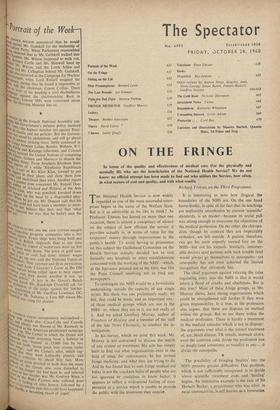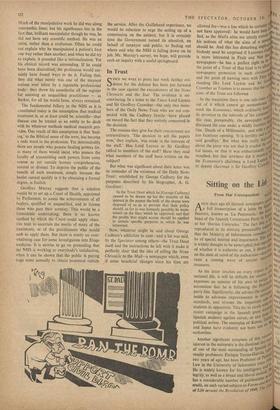ON THE FRINGE
In terms of the quality and effectiveness of medical care (for the physically and mentally ill) who arc the beneficiaries of the National Health Service? We do not know: no official attempt has been made to find out who utilises the Service, how often, in what sectors of cost and quality, and with what results.
Richard Titmuss on the Third Programme.
rr HE National Health Service is now widely .i regarded as one of the most successful enter- prises begun in the name of the Welfare State. But is it as admirable as we like to think? As Professor Titmuss has hinted on more than one occasion, there is almost a conspiracy of silence on the subject of how efficient the service it provides actually is, in terms of value for the taxpayers' money through improvement in the public's health. To avoid having to pronounce on this subject the Guillebaud Committee on the Health Services actually decided 'not to visit formally any hospitals or other establishments concerned with the working of the NHS'—which, as the Spectator pointed out at the time, was like the Press Council resolving not to read any
newspapers.
To investigate the NHS would be a formidable undertaking, outside the capacity of any single writer. But there was one preliminary study, we felt, that could be made, and an important one: of those medical groups which are not in the NHS—or, where they are in it, are not really of it. And we asked Geoffrey Murray, author of Frontiers of Healing and a member of the staff of the late News Chronicle, to conduct the in- vestigation.
In his survey, which we print this week. Mr. Murray is not concerned to discuss the merits of any system or treatment. His aim has simply been to find out what organisations exist in the field of what, for convenience, he has termed fringe medicine; and what they are trying to do.
And he has found that to seek fringe medical aid today is not the crackpot habit of people who are too ignorant or credulous to know better; it appears to reflect a widespread feeling of exas- peration at a service which is unable to provide the public with the treatment they require. It is interesting to note how illogical the
boundaries of the. NHS are. On the one hand homeopathy, in spite of the fact that its teachings
are deplorably unorthodox by current 'scientific' standards, is an insider—because its social pull was strong enough to overcome the objections of the medical profession. On the other, the chiropo- dists, though by contrast they are impeccably orthodox, are left outside. A patient, therefore, can get his teeth expertly treated free on the NHS—but not his toenails. Similarly, innumer- able doctors send patients with back trouble (and would always go themselves) to osteopaths—yet osteopathy has not even achieved the limited recognition that chiropody has.
The chief argument against relaxing the rules regulating entry into the NHS is that it would admit a flood of cranks and charlatans. But is this true? Most of these fringe groups, as Mr. Murray shows, have strong organisations which could be strengthened still further if they were given responsibility. It is true, as the profession also argues, that there are disputes on method within the groups. But so are there within the medical profession. There is hardly a treatment in the medical calendar which is not in dispute: the arguments over what is the correct treatment of, say, heart disease, TB, tonsils, stomach ulcers, even the common cold, divide the profession just as deeply (and sometimes as vocally) as any divide the osteopaths.
The possibility of bringing 'healers' into the NHS presents greater difficulties. One problem, which is not sufficiently recognised, is to decide where scientific treatment ends and 'healing' begins. An instructive example is the case of Sir Herbert Barker, a practitioner who was what, in rural communities, is still known as a bonesetter.
Much of the manipulative work he did was along osteopathic lines; but his significance lies in the fact that, brilliant manipulator though he was, he did not have any scientific method. He was an artist, rather than a craftsman. Often he could not explain why he manipulated a patient's foot one way rather than another; and when he did try to explain, it sounded like a rationalisation. Yet his clinical record was astounding. If he could have been discredited, the profession would cer- tainly have found ways to do it. Failing that, they did what surely was one of the meanest actions ever taken by a reputable professional body: they threw his anaesthetist off the register for assisting an unqualified practitioner — as Barker, for all his world fame, always remained.
The fundamental fallacy in the NHS as it is constituted today is the assumption that medical treatment is, or at least could be, scientific—that disease can be treated as an entity to be dealt with by whatever methods medical research pro- vides. One result of this assumption is that `heal- ing,' in the Biblical sense of the term, has become a rude word in the profession. Yet demonstrably there are people who possess healing powers (or, as many of them would insist, who possess the faculty of transmitting such powers from some source as yet outside human comprehension, natural or divine). To deprive the public of the benefit of such treatment, simply because the healer cannot qualify in it by obtaining a formal degree, is foolish.
Geoffrey Murray suggests that a solution would be to set up a Court of Health, appointed by Parliament, to assess the achievements of all healers, qualified or unqualified, and to license those who pass their scrutiny. This would be a formidable undertaking; there is no known method by which the Court could apply objec- tive tests to ascertain the merits of many of the treatments, or of the practitioners who would seek to apply them. But there is surely an over- whelming case for some investigation into fringe medicine. It is unwise to go on pretending that the NHS is working to everybody's satisfaction, when it can be shown that the public is paying huge sums annually to obtain treatment outside the service. After the Guillebaud experience, we would be reluctant to urge the setting up of a commission on the subject; but it is certainly time the Government turned its attention, on behalf of taxpayer and public, to finding out where and why the NHS is falling down on its job. Mr. Murray's survey, we hope, will provide such an inquiry with a useful springboard.















































 Previous page
Previous page